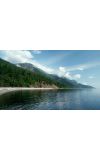
02 Jun 2013 03:35:12
Between February and July 2010, Sylvain Tesson lived alone in a remote Siberian cabin on the shore of Baikal, the world's biggest freshwater lake. He had six shopping trolleys' worth of pasta; enough vodka to get regularly drunk; a stack of books that included volumes by Nietzsche, Sade, Camus and Shakespeare; mountaineering equipment, and not much else. "Freedom is always available," reads one of the epigraphs that start the book. "One need only pay the price for it." It's hard to imagine a more macho spiritual retreat. Tesson chops wood in Arctic temperatures, drills through the thick crust of the frozen lake for water, and spends hours watching the changing light. "I who used to pounce on every second to make it surrender and give up its all," he writes, "– I am learning the art of contemplation. The best way to observe a monastic calm is to find oneself obliged to do so." There's a deep sense of relief when spring comes, and with it seals, ducks, insects, bears and drowsing in hammocks.
Tesson has already crammed a lot into his 41 years. He's won a major short story award, the Prix Goncourt, and published half a dozen adventure travelogues in his native France. "The alchemy of travel thickens seconds," he says, but it also made him "frantic with restlessness" and his trips "finished in track races against the hours". Now he wants space, silence and solitude, to appreciate the least flashy instances of beauty. It works: at one point he catches himself rhapsodising about dust, and comments, "March is going to be a long month".
For anyone who secretly dreams of a life that's both simpler and more physically demanding – and there are a lot of those people, if the current craze for a certain sort of dystopian fiction is anything to go by – Tesson's descriptions of bruised-looking Siberian sunsets and Baikal in the rain ("a coal-black flannel pricked by a deluge of needles") are a draft of cool air. He conjures villages that "smoke at the foot of hills", and traces the gold-and-turquoise glow of the cracks in the lake's frozen mantle, which look like "photos of stardust clouds" as they're hit by the sun. Reading a travelogue may be a poor substitute for travel, but Tesson's precise, meditative prose does a good job of slowing the pulse.
When he's not admiring the view or struggling through blizzards, Tesson wrestles with life's big questions, making grand pronouncements, such as "the hermit absorbs the universe" and "all dialogue is battle". For the most part, he comes across as a classic Übermensch – smoking cigars on mountain peaks and sleeping rough with one hand on a flare gun to fend off bears – but we occasionally get to see a wounded man underneath the heroics.
"The courageous course would be to face things," he reflects on one rainy evening: "What am I? Contemptible, frightened by the world." The following month, his girlfriend breaks up with him via a text message to his satellite phone. "Everything has collapsed," he writes, and cries into the fur of his dogs. "Time doesn't hand out second chances, and me, I hared off to the forest, leaving her behind."
While it would be easy to mock some of Tesson's haughtiest moments as typical Parisian high-mindedness, the fact he's so unabashed about his soul-searching is what sets the book apart from the typical 21st-century memoir. He seems to belong to an earlier era of swashbuckling adventurers and public intellectuals who were out to change the world. There's humour and humanity here, but also a serious attempt to answer the question, "How should a person live?"

